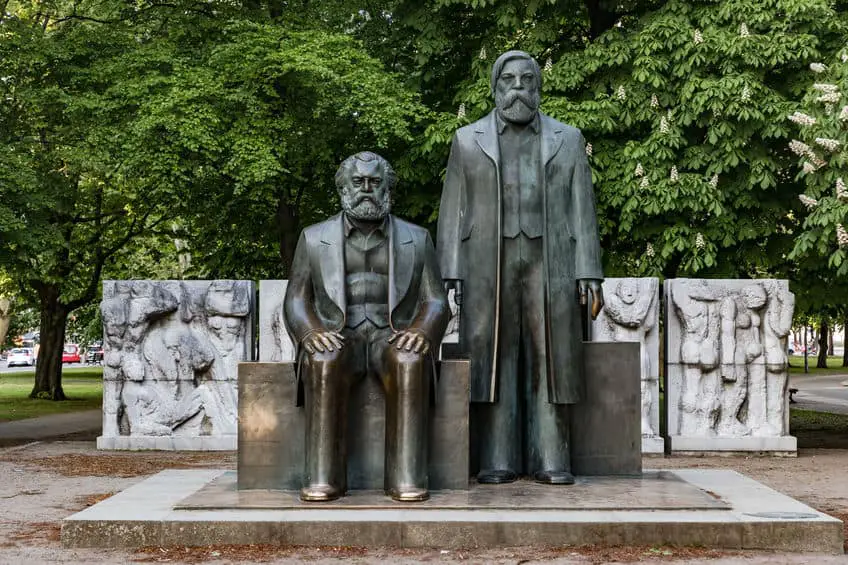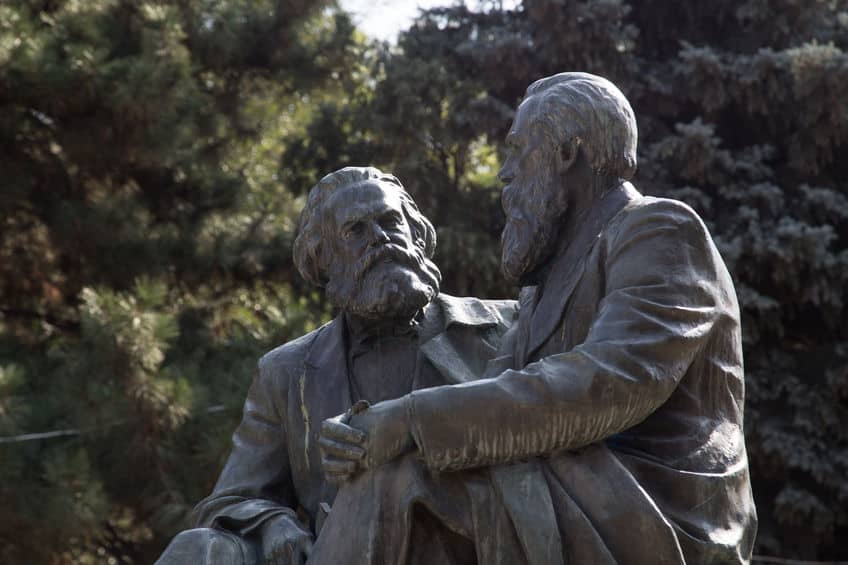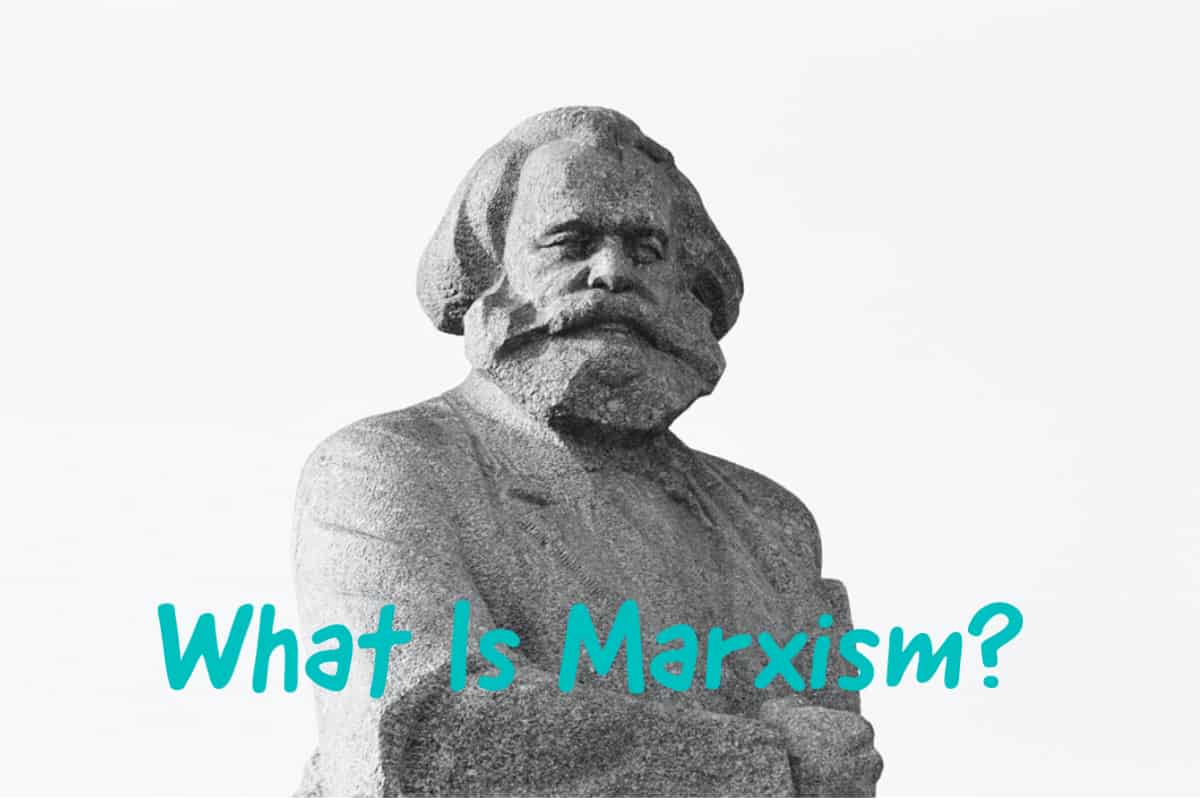Marxism has been thrown around quite a bit in the present-day United States political scene. However, there is a lot of confusion about what exactly Marxism is and what it means to be a Marxist.
Marxism is the political, social, and economic theory named after Karl Marx. A significant contributor to Marxism was Friedrich Engels. Marx and Engel’s economic theory examines capitalism’s effect on labor, productivity, society, and overall economic development. They believe the relationship between the capitalist or business owners and the workers or laborers is exploitative, and the workers are always at a disadvantage.
Table of Contents
- The Definition of Marxism
- The Marx Theory of Historical Materialism
- Who Was Karl Marx?
- Related Questions
The Marxists believe the relationship between the capitalists and the workers is explosive, so the workers will seek to overthrow the Capitalist system. The Marxists believe the worker should seek to overthrow the Capitalist government system in favor of the communist system of government.
The Definition of Marxism
Marxism is the social, political, and economic philosophy named after German political activist Karl Marx. Friedrich Engels is also a significant contributor to Marxist thought and philosophy.
Marxism studies and examines capitalism’s effect on labor, productivity, and economic development. Marxism looks at social classes and categories, sees the relationship between many of these social classes as unequal or uneven, and argues for a worker to revolt and overturn capitalism in favor of another system, such as socialism or communism.
For many, Karl Marx or Marxism is equated to something bad or a lack of freedom. Many countries have adopted the Marxist philosophy, as the former Soviet Union, China, Vietnam, Lao, and Cuba have all relied heavily on Marxism. Because of this, Karl Marx’s philosophy on trying to understand the relationship between capitalism and the workers on a social and economic system remains valid today.
The Marx Theory of Social Economic Systems
In simple terms, Marxism saw economics and the running of the economy in a society with two major groups:
Capitalists
Capitalists are the business owners who organize production and manufacturing. The capitalist owns factories, tools, and raw materials. They are entitled to any profits made by the factory.
Marxism sees Capitalism as based on commodities or things bought and sold. In Marx’s view, the employee’s labor is a commodity as it is bought and sold. He saw the capitalists as the business owners or the elite.
Laborers or Proletariat or Workers
A much larger class or group of people is the laborers Marx calls workers, laborers, or the proletariat. The laborers do not own any production, raw materials, or facilities. They are not entitled to any of the profits. The laborers work in exchange for money or wages. The Laborers are, in other words, everyday working men and women.
Marxism saw the arrangement between the capitalists and the laborers as uneven and favored the capitalists. They felt the capitalists or Elite could enjoy their lavish lifestyle due to laborers’ work.
The relationship between the capitalists and the Laborers was exploited as the capitalists received so much more from the relationship than the Laborers.
In other words, Marx felt the capitalists or elite exploited the everyday workers or, as he called them, the proletariat. Without the work of the laborers, the Capitalists would not have the means of production – all they would have is a factory, raw materials, and no way to produce or sell the goods if they did not have the workers producing them.
The Marx Theory of Historical Materialism
Another contribution that Marx made is known as the materialist concept of history or historical materialism. It is this theory that is based upon much of the communist thinking around the world.
Historical Materialism is defined in Marxism as:
..”the doctrine that all forms of social thought, as art or philosophy, and institutions, as the family or the state, develop as a superstructure founded on an economic base; that they reflect the character of economic relations and are altered or modified as a result of class struggles; that each ruling economic class produces the class that will destroy or replace it; and that dialectical necessity requires the eventual withering away of the state and the establishment of a classless society: the body of theory, in dialectical materialism, dealing with historical process and social causation.”
Dictionary.com
Marxist Thought in Simple Terms
Marxism can be very complex and not always very easy to understand, yet it is a theory and thought that continues to be part of our world order today.
Here are some fundamental concepts to remember about Marxism and why it continues to remain an essential economic thought today:
Struggle Between Capitalist and Labor (Working Class)
At the core of Marxism is the social, political, and economic theory that focuses on the inherent struggle between the Capitalist (or those who own and have money) and the working class (laborers or those who do not).
Exploitative Relationship
Marx believed that the relationship between the capitalists and the workers was an inherently explosive power struggle and would always create class conflict.
Revolution
Marx believed that the conflict between the capitalists and workers or the haves and have-nots of society would lead to a revolution where the working class would overthrow the capitalist class and seize control of the economy. Marxism argues for the workers to revolt and overturns the capitalist system in favor of the communist system.

The bronze monument of Karl Marx and Friedrich Engels in Berlin-Mitte
Marx’s Timeless Insight: Examining the Ongoing Conflict Between Capitalists and Workers
Many of the issues that Marx saw with the conflict between the capitalist (elite) and the laborer (workers or everyday men and women) are things that we continue to see today. Here are some of Marx’s key points:
- The capitalists or business owners are incentivized to get the most work out of their laborers while trying to pay them the lowest wages possible to maximize their profits.
- Even though ordinary laborers are an important or even key part of this economic process, they lack power as they do not own factories, buildings, or materials.
- In a Capitalist system, workers can be readily replaced when many others take their place. As workers are readily replaceable, this further devalues their worth. In other words, companies can choose who they will hire and for what price if many people are looking for the same job. They can hire someone below their actual worth or wage.
- Marx felt the elite, or bourgeois, as he called them, would purposely employ social institutions to keep the workers down and that the government would help enforce the will of the bourgeoisie to control the workers’ power.
- Marx felt organized religion provided a similar function to the government to convince the workers or proletariat to accept and submit to their exploitation. Karl Marx called religion “the opium of the people.” This is why freedom of religion in countries with Marxist thinking is neither allowed nor guarded.
- Marx believes financial institutions are set up to keep the workers or proletariat in debt and engineer financial recessions. This would help the bourgeois and not the workers and allow the bourgeois to stay in power.

Who Was Karl Marx?
Karl Marx (1818-1883) was a German philosopher, author, social theorist, and economist. He was born in Trier, Prussia (present-day Germany). His father was a successful Jewish lawyer who converted to Lutheranism before Marx’s birth.
At University, Karl Marx studied law in Bonn and Berlin. It was here he was introduced to the radical ideas of G.W.F. Hegel and became a social activist. He later received a Ph.D., but as he was considered too radical for his day, he could not secure a teaching position at any university in Europe. He became a journalist for a liberal newspaper.
Karl Marx married Jenny von Westphalen, a theatre critic and political activist. They had seven children. Four of their children died before the age of 8 years old.
Karl Marx’s three surviving children, all daughters, became political activists. His oldest daughter, Jenny Caroline, died at age 38 of bladder cancer. She had six children, and two of her sons, Jean Longuet and Edgar Longuet, went on to become political activists.
Karl Marx’s other two daughters, Jenny Laura and Jenny Julia Eleanor, committed suicide. Jenny Julia Eleanor married the famous Cuban-French revolutionary and Marxist socialist and activist Paul Lafargus.
Karl Marx is famous for his theories about capitalism and communism. Together with Fredrich Engels, they published the Communist Manifesto in 1848 and later Das Kapital (published in 1867, 1885, and 1894).
Karl Marx’s theories were radical for his time and were not well accepted in mainstream Europe. After 1845, he was considered stateless because he was not welcome to live in France, Germany, Belgium, or most parts of Europe. In 1849, Marx moved to England and lived there until he died in 1883.
To understand Marx, you also need to understand a bit about the world he lived in. He saw workers being exploited and the rich living luxurious lifestyles. He would have seen everyday people struggling to stay alive and feed their families as they were not paid enough to survive.
To get a taste of Karl Marx’s world when he lived, you only need to read some of Charles Dickens’ novels or stories like A Christmas Carol, Oliver Twist, Great Expectations, and A Tale of Two Cities. In his stories, Dicken explores the conflict between the capitalists or the elite and the working class during this time.
Whether you love or hate Marxism, the truth is that Karl Marx gave the world an economic and social thought that remains relevant today. Many countries worldwide have based all or part of their government and social systems upon the theories and teachings of Karl Marx.
At A Bus On A Dusty Road, we talk about travel, life, and ex-pat living. We are all about “Living Life As A Global Citizen.” We explore social, cultural, and economic issues and travel.
We would love to have you be part of our community. Sign up for our newsletter to keep up-to-date by clicking here. If you have any questions, you can contact me, Anita, by clicking here.
Listen to our Podcast called Dusty Roads. You can find it on all major podcast platforms. Try out listening to one of our podcasts by clicking here.
Subscribe to our A Bus On A Dusty Road YouTube Channel filled with great videos and information by clicking here.
Related Questions
What Is The Vietnamese Propaganda Art?
Propaganda posters first started in the Soviet Union and then spread to other socialist countries like Vietnam. For many years, the posters have been an important part of the Vietnamese art scene. You can still see the propaganda art posters around Vietnam.
You can discover more by reading our blog Vietnamese Propaganda Art, All You Need To Know by clicking here.
Who Built the Long Bien Bridge in Hanoi, Vietnam?
The Long Bien Bridge in Hanoi, Vietnam is an iconic bridge that was designed by the great architect Gustave Eiffel. The bridge has a long history and is an important part of the history of French rule in Vietnam. It was a target of bombings by the American forces during the Vietnam War. Today you can ride a motorcycle, bicycle, or walk across the Long Bien bridge.
You can learn more by reading our blog Who Built the Long Bien Bridge in Hanoi, Vietnam? by clicking here.

